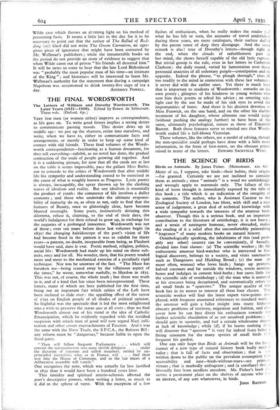THE FINAL WORDSWORTH
The Letters of William and Dorothy Wordsworth. The Later Years (1831-1850). Edited by Ernest de Selincourt. Three vols. (Oxford. 63s.)
VERY few men (or women either) improve as correspondents, as life goes on. To write good letters implies a strong desire to communicate passing moods. This desire dries up in middle age : we put up the shutters, retire into ourselves, and write, when we have to, either to communicate facts and arrangements, or merely in order to keep up some kind of contact with old friends. These final volumes of the Words- worth correspondence—fascinating as a human document, for they tell everything—exhibit, as no novel has done, the gradual contraction of the souls of people growing old together. And it is a saddening picture, for now that all the cards are at last
on the table it seems impossible, pace the gallant Miss Batho, not to concede to the critics of Wordsworth that after middle life his sympathy and understanding ceased to be exercised in the cause of what is roughly known as Progress. Lyric poetry is always, inescapably, the spray thrown up by the dashing waves of idealism and reality. But any idealism is essentially
the product of youth : the commerce of life involves a duller economy ; and those who undertake the ultimate responsi- bility of maturity do so, as often as not, only to find that the features of Beauty, once so glitteringly clear, have become blurred overnight. Some poets, instinctively divining this dilemma, refuse it, claiming, to the end of their days, the world's indulgence for their refusal to grow up, in exchange for the auguries of a prolonged innocence. Wordsworth was not of these ; over ten years before these last volumes begin (in 1831) the changing kaleidoscope of the poet's vision of life had become fixed in the pattern it was to exhibit for thirty years—a pattern, no doubt, inseparable from being, as Flaubert would have said, dans le vrai. Poetic method, religion, politics, social life: Wordsworth had made up his mind on these sub- jects, once and for all. No wonder, then, that his poetry tended more and more to the mechanical exercise of a peculiarly rigid technique. Nor was he unaware of the fact. "The Muse has forsaken me—being scared away by the villainous aspect of the times," he wrote, somewhat ruefully, to Haydon in 1831. This was not, of course, the whole truth ; but there was truth in it, and of a kind that has since been misrepresented. These letters, many of which are here published for the first time, bring out an important fact which critics of the Left have been inclined to slide over : the appalling effect of the terror of 1793 on English people of all shades of political opinion. So frightful was the spectacle that it led the most enlightened
into a wish to preserve the status quo at all costs ; thus we find Wordsworth almost out of his mind at the idea of Catholic Emancipation, which he evidently regarded with the terrified suspicion with which men of good will now regard Nazi infil- tration and other covert encroachments of Fascism. And it was the same with the Slave Trade, the S.P.C.A., the Reform Bill : any reform must be " dangerous," because liable to open the flood-gates.
" Then will follow frequent Parliaments . . . which will convert the representatives into mere slavish delegates . . . under the dictation of ignorant and selfish members, misled by un- principled journalists, who, as in France, will . . . find their way into the House of Commons, and so the last traces of a deliberative assembly will vanish."
One recognises the note, which was actually far less justified in 1831 than it would have been a hundred years later.
This timidity and spiritual arterio-sclerosis affected the poet's descriptive powers, when writing a letter, as much as it did in the sphere of verse. With the exception of a few
flashes of enthusiasm, when he really makes the reader feel what he has felt or seen, the accounts of travel undertaken during these years, are mere catalogues, their surface dulled by the patent sense of duty they disengage. And the same remark is alas! true of Dorothy's letters—though right at the end, when the clouds of enfeeblement part In her mind, she shows herself capable of the old lyric rapture. But trivial gossip is the rule, even in her letters to Catherine Clarkson: the daily round, varied by lamentation over those perennial anxieties of all sedentary people—constipation and its opposite. Indeed the phrase, " to plough through," rises all too readily to the mind in connexion with these last volumes ; it never did with the earlier ones. Yet there is much here that is important to students of Wordsworth : remarks on his own poetry ; glimpses of his kindness to young writers who sent him their poems or asked his advice ; an amusing side- light cast by the use he made of his sick eyes to avoid the importunities of bores. And there is his discreet devotion to Miss Fenwick, on the one hand, and on the other his shabby treatment of his daughter, whose ailments one would judge (without pushing the analogy further) to have been of the same, ultimately psychological, nature as those of Elizabeth Barrett. Both these features serve to remind one that Words- worth ended life a full-blown Victorian.
These volumes, like the others, are a model of editing, though the non-specialist could perhaps have done with a little more information, in the form of foot-notes, on the obscure points










































 Previous page
Previous page